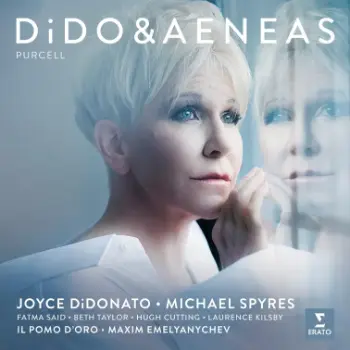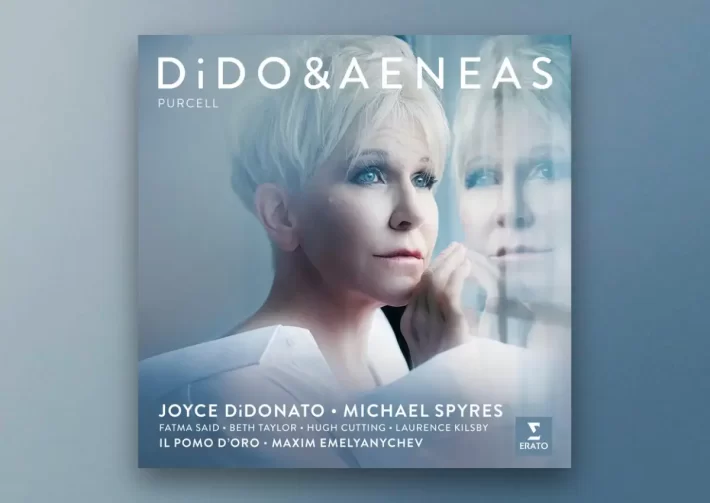Joyce DiDonato reunites with Il Pomo d’Oro and conductor Maxim Emelyanychev for a recording of Purcell’s Dido and Aeneas. The collaboration follows their 2022 project Eden (reviewed here), and focuses here on one of the most compact and enduring works in the operatic repertoire.

Emelyanychev leads a vividly dramatic reading. My prime recommendation up to now has been David Bates’s 2023 Pentatone recording with La Nuova Musica and Fleur Barron as Dido. I also have a soft spot for Pinnock’s English Consort reading on Archiv (1989), with Anne Sophie von Otter’s touchingly vulnerable performance of Dido. But DiDonato’s interpretation goes beyond those two readings, charting the Dido’s emotional upheaval with unerring mastery. Her astonishing vocal prowess (in which the voice is never ‘scaled back’ to fit an idealized Baroque sound) dispatches every technical hurdle with ease, focusing our attention on the unfolding emotional tragedy.
DiDonato’s emotional portrayal is intensified by Il Pomo’s theatrical accompaniment. The string ensemble, using little if any vibrato, offers a lean and luminous sonority, which can harden into a more astringent edge when the music calls for it. The continuo is also large, including two harpsichords, two theorboes (a picture in the booklet shows three, but only two are listed), a guitar, harpsichord, and organ. Koen Plaetinck’s percussion adds a much-appreciated raucousness to the many dance numbers, and a particularly threatening storm at the beginning of Act II.
I went back and forth about Michael Spyres portrayal of Aeneas. Sometimes I found his interpretation noble and engaging, but other times it felt callous when compared to Gerald Finley (Age of Enlightenment Orchestra and Choir/Chandos) and Matthew Brook (Pentatone) recordings, both of whom convey the conflicting emotions of departing for Italy versus staying with Dido more completely. If Spyres’s Aeneas makes that decision more easily, that is Spyres’ dramatic choice, and I simply do not care for it.
Beth Taylor’s sneering Sorceress is terrific: as she lays her plan to destroy the lover’s relationship and then shifts her attention to her next act of sabotage, we clearly sense a malignant presence that want to cause pain in others. Her witches are vividly sinister; while some may feel the portrayals approach caricature, I found them truly chilling.

Maxim Emelyanychev (image: ©️ Andrej Grilc)
The remainder of the cast is just as impressive. Fatma Said’s Belinda is beautifully sung (listen to her lovely duet with Dido on track 8), making her deep connection with and affection for her Queen clear.
The chorus makes the most of its many roles, though I disagree with the decision to end the opera by singing the final chorus twice (I prefer to have the chorus echoed by the strings alone). But their characterizations are vivid: listen to their rowdy sailors at the beginning of Act III, and the forlorn grief they bring to the end of the same act.
I sometimes find the singer’s words difficult to understand, an issue of Erato’s slightly distant engineering. By contrast, the Pentatone recording is so clear, one rarely needs to consult the libretto. Erato’s liner notes are cursory: a performance of such excellence warrants more engaging and thorough notes. But the full libretto, along with French and German translation, is provided, along with several color photographs of the performers.
Had I attended this performance live on tour, I would have been thrilled. On repeated listening, I might still rate the Bates/Pentatone album more highly, for textual clarity and Bates’s willingness to relax a bit more (Emelyanychev’s ceaseless forward drive might prove tiring on repeated listening). But of course, most readers would argue that Dido is the best reason to favor a recording, and DiDonato portrayal is a fabulous achievement.
Recommended Comparisons
Bates | Pinnock | Lewis | Christie | Jacobs

Album Details |
|
|---|---|
| Album name | Dido & Aeneas |
| Label | Erato / Warner Classics |
| Catalogue No. | 2284884 |
| Cast | Joyce DiDonato (Dido), Michael Spyres (Aeneas), Fatma Said (Belinda), Carlotta Colombo (Another Attendant), Hugh Cutting (Spirit, in the form of Mercury), Beth Taylor (Sorceress), Laurence Kilsby (Sailor), Alena Dantcheva (First Witch), Anna Piroli (Second Witch). |
| Artists | Il Pomo d’Oro, Maxim Emelyanychev (conductor) |


















